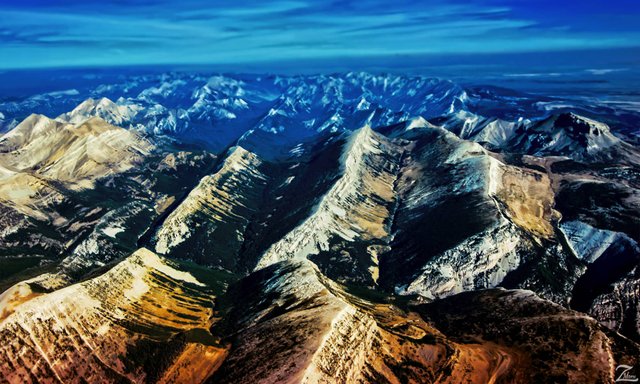Sun River Canyon on the Sawtooth Range in Montana
This is the jagged Sawtooth Range in south eastern Montana where the Sun River passes through from the mountains to the plains. You can clearly see where it got the name Sawtooth from, this is one of the best exposed examples of imbricate thrust faulting in the foreland fold and thrust belt of the western United States.
Though in the shadow of Glacier National Park yet no less spectacular, the Sawtooth Range forms a chainsaw ridged crest of peaks that are dramatically fronted by flat-iron plates. Full of fossils from seashells, corals, and tubeworms, these limestone strata were once the floor of shallow Cretaceous-era seas, some 70 to 100 million years ago.
In the immediate foreground in this image you can see Sun River Canyon, where the Sun River has cut its way through the limestone over millions of years. Human history in the Sun River canyon goes back possibly 12,000 years. The oldest stories tell of early First Nations Tribes, primarily Crow, Salish, and Blackfeet, who hunted the abundant elk, deer, and migrating buffalo along the rich watershed of the Sun River also known as the “Medicine” River.
Early man came through here, as well as historical Native tribes from both sides of the mountains, and they left their marks to tell their story. The site is near the junction of two important trails. One is the Old North Trail that runs north south from near Edmonton, Alberta into northern Mexico. The other comes across the mountains east and west and is called “Raising Dust Trail” by the Blackfoot.
Tribes like the Flathead, Pend d’Oreille, Kutenai, Nez Perce and others from the Plateau area on the west side of the mountains came through here to hunt the buffalo of the plains. From here they could send out their scouts to see if the Blackfoot were in the area and decide if a peace could be made. Or if the Blackfoot were elsewhere they might just be able to complete their hunt and be back across the mountains before being discovered. Dragging their travois with horses or dogs, the dust could be seen for miles.
(Research Source)
The Blackfeet called the Sun River Valley the “best game country west of the Mississippi” and “Corner of the World” because of the Rocky Mountains to the south and to the west that channeled the wildlife into the Valley. However, the quality of the hunting grounds caused frequent conflicts between the tribes inhabiting the area.
Sometime in the late 1700’s or early1800’s, a tragic battle between the Blackfeet and Crow occurred near the headwaters of the Sun and resulted in significant casualties on both sides. To this day, stories of the battle remain interwoven throughout Blackfeet and Crow oral histories.
(Research Source)
I lensed this image late in the afternoon while exploring the area north of Yellowstone National Park in the springtime. This is from my ongoing project in which I am trying to raise awareness of the 47% of the USA and 90% of Canada that remain unpopulated wilderness.
Where Eagles Fly - The American Wilderness Expedition is my personal mission to introduce people to these amazing locations that surround us.
If you are interested in helping with this project please consider upvoting and resteemit so that others may experience these wondrous places as well.
Yehaw!!

Nice post my frends and i like photography
Glad you managed to sort out the problem with a few source credits, awesome work as always. Aviation and photography best combination for worldwide inspiration. When I grow up, I want your job......Lol
wow..what awesome photography .so fantasy....everything is looking like an imagination of mind that how these are all in the same range..i like it.
Love that birds eye view of mountains!
I look forward to every post thanks so much for doing what you do!
Amazing photography s always. Glad to see you have your problem with sourcing sorted out. I wonder if tour guides need to point out their sources when giving out historical information? Just a thought..